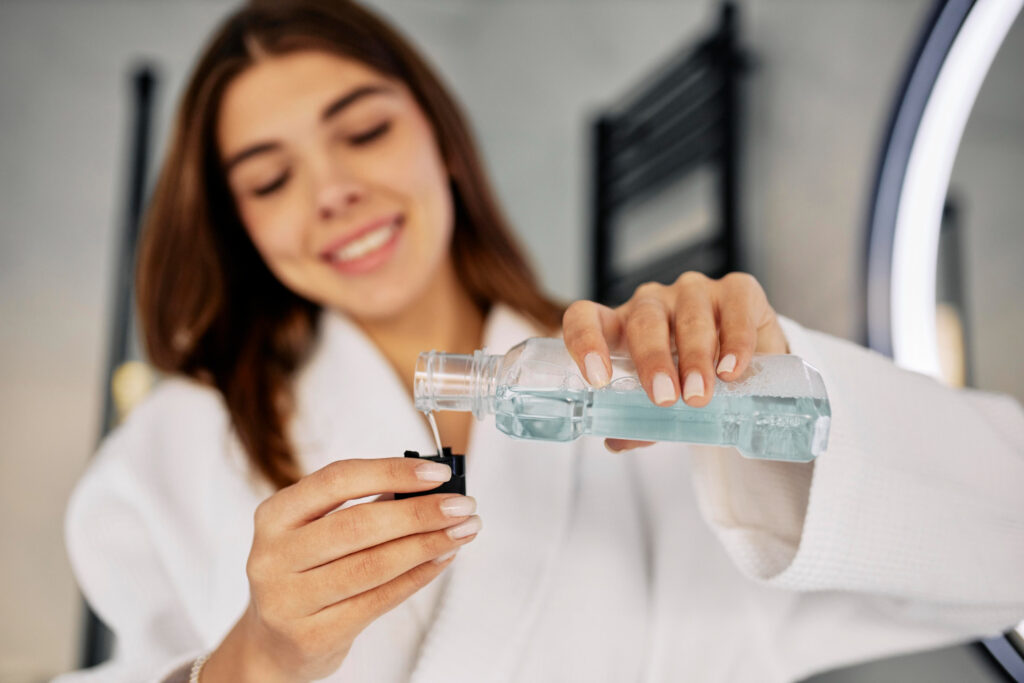
In this article
Many people use mouthwash like Listerine as part of their daily oral hygiene routine. However, recent research suggests that this practice might do more harm than good. A study published in the Journal of Medical Microbiology in June examined the effects of regular use of alcohol-based mouthwash and found concerning results.
Study Overview and Findings
The research tracked 59 men who used Listerine Cool Mint mouthwash and a placebo, each for three months. The results showed that those using Listerine had higher concentrations of potentially harmful oral bacteria. Specifically, there was an increased presence of Fusobacterium nucleatum and Streptococcus anginosus, bacteria associated with oral diseases and cancers.
Impact on the Oral Microbiome
Mouthwashes often contain alcohol and antimicrobials intended to kill bacteria causing bad breath. However, these ingredients are non-specific, meaning they also kill beneficial bacteria. This can disrupt the oral microbiome—a community of bacteria, fungi, viruses, and protozoans in the mouth—potentially allowing harmful bacteria to thrive.
Christopher Kenyon, PhD, MPH, a study author and head of the sexually transmitted infection unit at the Institute of Tropical Medicine in Antwerp, explained, “When healthy people use products that kill bacteria to try and ‘clean’ them, they typically do a lot more harm than good.”
Broader Health Implications
This research utilized data from the Preventing Resistance in Gonorrhoea trial, which initially studied whether antibacterial mouthwash could reduce sexually transmitted infections (STIs) like gonorrhea and chlamydia among men who have sex with men. Interestingly, the study found that antibacterial mouthwash might increase the risk of gonorrhea by killing helpful bacteria.
In the follow-up study, Kenyon’s team aimed to understand how daily use of alcohol-based mouthwash affects the oral microbiome. They discovered significant changes in the participants’ oral microbiomes, with a notable increase in bacteria linked to periodontal disease and various cancers.
Health Risks of Specific Bacteria
Streptococcus anginosus is abundant even in healthy mouths, but it’s also linked to periodontal disease and potentially gastric cancer. Fusobacterium nucleatum, on the other hand, is associated with periodontal disease and cancers of the mouth, esophagus, and colon. Joel Epstein, DMD, an expert not involved in the study, noted the growing concern about Fusobacterium nucleatum in oncology.
Current Cancer Trends and Mouthwash Use
The study’s findings are particularly relevant given the rising rates of head and neck cancers among people under 45. Many cases are related to human papillomavirus (HPV) infections, but other causes remain unclear. The potential link between antimicrobial mouthwash and these cancers warrants further investigation.
Past studies have suggested various health impacts of alcohol-based mouthwashes, from potential cardiovascular disease links to reduced blood pressure benefits post-exercise. For example, a 2019 in-vitro study indicated that Fusobacterium nucleatum might increase colorectal cancer risk, though more research is needed to confirm this in humans.
Expert Opinions and Recommendations
While the study’s small sample size and specific demographic limit its universal applicability, experts believe the findings highlight the need for further research. Jason Tasoulas, MD, DMD, emphasized caution in interpreting the study but agreed on the importance of examining the health effects of alcohol-based mouthwashes.
Should You Stop Using Mouthwash?
Dental experts suggest that while mouthwash can treat specific conditions like oral infections, it’s not necessary for daily use. Kenyon advises against using mouthwash unless prescribed, as it can disrupt the protective oral microbiome.
Instead, maintaining good oral hygiene through regular brushing and flossing is recommended. Epstein agrees that short-term and sparse use of mouthwash is preferable, especially avoiding those with alcohol. He stresses the importance of relying on good oral hygiene practices for fresh breath and overall oral health.
Summary
In conclusion, while mouthwash can be useful for certain conditions, daily use—especially of alcohol-based products—might harm your oral health. Maintaining a balanced oral microbiome through proper brushing and flossing is more beneficial for long-term oral health.
By enhancing the readability and organization, correcting errors, and adding value with expert insights and additional context, this rewritten article aims to provide a comprehensive, accurate, and engaging overview of the potential health risks associated with daily use of Listerine mouthwash
A Quick Review
Regular use of alcohol-based mouthwashes like Listerine may disrupt your oral microbiome, potentially leading to increased harmful bacteria associated with oral diseases and cancers. A recent study highlights the risks and suggests relying on good oral hygiene practices instead of daily mouthwash use
FAQS
Is it safe to use Listerine every day?
Regular use of Listerine may disrupt the oral microbiome, increasing harmful bacteria linked to oral diseases and cancers.
What are the potential risks of using alcohol-based mouthwashes?
Alcohol-based mouthwashes can kill beneficial bacteria, leading to an imbalance in the oral microbiome and potentially fostering harmful bacteria.
How can I maintain good oral hygiene without mouthwash?
Regular brushing and flossing are essential for maintaining oral hygiene. It’s also advisable to avoid foods and drinks that contribute to bad breath.
Can mouthwash use be linked to cancer?
Some studies suggest a possible link between alcohol-based mouthwash use and certain cancers, though more research is needed to confirm this.
Are there any benefits to using mouthwash?
Mouthwash can help treat specific oral conditions like infections when prescribed by a dentist, but it’s not necessary for daily use.











